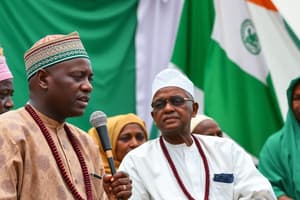Podcast
Questions and Answers
What is federalism?
What is federalism?
- A system where political powers are delegated only to local governments.
- A system where political powers are controlled by state governments.
- A system where political powers are shared between the central government and component units. (correct)
- A system where political powers are concentrated in the central government only.
When did Nigerian federalism originate?
When did Nigerian federalism originate?
- 1999
- 1960
- 1945
- 1914 (correct)
Which feature is NOT associated with federalism?
Which feature is NOT associated with federalism?
- Adoption of a written constitution
- Supremacy of the central government
- Decentralization of all powers to local governments (correct)
- Existence of bicameral legislature
Why was federalism adopted in Nigeria?
Why was federalism adopted in Nigeria?
What aspect of Nigerian federalism aims to prevent domination by one ethnic group?
What aspect of Nigerian federalism aims to prevent domination by one ethnic group?
Who is the head of both the state and government at the Federal level in Nigeria?
Who is the head of both the state and government at the Federal level in Nigeria?
Which tier of government in Nigeria is responsible for providing primary healthcare services?
Which tier of government in Nigeria is responsible for providing primary healthcare services?
What powers mainly reside with the Federal Government in Nigeria?
What powers mainly reside with the Federal Government in Nigeria?
What does federalism aim to prevent between different levels of government?
What does federalism aim to prevent between different levels of government?
Which level of government in Nigeria is responsible for issues like defense and national security?
Which level of government in Nigeria is responsible for issues like defense and national security?
Flashcards are hidden until you start studying
Study Notes
Meaning of Federalism
- Federalism is a system of government where political powers are shared between the central government and component units, which are state and local governments.
Features of Federalism
- Division of governmental powers between the central government and component units.
- Different levels of government derive their powers from the constitution.
- Adoption of a written constitution.
- The constitution is rigid.
- The constitution is supreme.
- Supremacy of the central government.
- Existence of bicameral legislature.
Reasons for Adoption of Federalism in Nigeria
- Fear of domination by one ethnic group over smaller groups.
- Tribal differences in culture, religion, language, custom, and tradition.
- Protection of minority groups from oppression by the majority group.
- Large geographical size and high population of the country.
- Bringing the government closer to the people through local government.
- Expansion of local markets.
Structure of Government in Nigeria
- Three tiers of government: Federal Government, State Government, and Local Government.
- Federal Government is responsible for handling issues affecting the entire country.
- State Government is responsible for managing affairs within the state.
- Local Government is responsible for administering local areas.
Powers and Duties of Government in Nigeria
- Exclusive list or power: Federal Government has powers over police affairs, currency, foreign affairs, defense, telecommunication, immigration, and emigration.
- Concurrent list or power: Powers shared between Federal Government and State Government, as stipulated by the constitution.
Studying That Suits You
Use AI to generate personalized quizzes and flashcards to suit your learning preferences.




